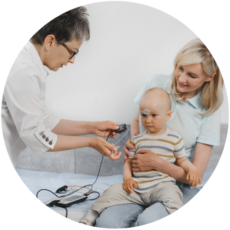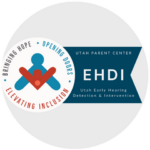

National Audiology Awareness Month
Article contributed by Stephanie Browning McVicar, Au.D., CCC-A, Doctor of Audiology
Early Hearing Detection & Intervention (EHDI); Cytomegalovirus (CMV) Public Health Initiative; Children’s Hearing Aid Program (CHAP) Director
What is an audiologist?
Audiologists are the primary healthcare professionals who evaluate, diagnose, treat, and manage hearing loss and balance disorders in individuals of all ages from infants and teens to adults and the elderly.
Audiologists work in many types of settings, including:
- Hospitals
- Clinics
- Private practices
- ENT (Ear, Nose and Throat physician) offices
- Universities
- K-12 schools
- Government
- Public health
- Military
- Veterans’ Administration (VA) hospitals
Most audiologists earn a doctor of audiology (AuD) degree. Some earn a doctor of philosophy degree (PhD) or doctor of science (ScD) degree in the hearing and balance sciences.
Audiologists must be licensed or registered for practice in all states, the District of Columbia, and Puerto Rico.
Audiologists are also required to stay up to date on the latest hearing and balance health care. In Utah, audiologists must complete at least 20 hours of continuing professional education every two years. This education must be directly related to their professional practice.
How does an audiologist differ from “hearing instrument specialists” or ENTs?
What is a hearing instrument specialist/hearing aid dispenser?
According to the International Hearing Society, a hearing instrument (hearing aid) specialist is a state-licensed hearing health professional trained to evaluate common types of hearing loss in adults and fit hearing aids. They are typically licensed to perform tasks related to hearing aid fittings, such as program hearing aids and make earmold impressions. Hearing instrument specialists do not diagnose hearing loss or hearing disorders and are not trained to diagnose and treat tinnitus (ringing in the ears), hyperacusis (abnormal perception of sounds), auditory processing disorders, or other auditory cognitive processing skills.
In Utah law, a licensed hearing instrument specialist can test the hearing of a patient over the age of 17 for the sole purpose of determining whether a hearing loss will be sufficiently improved by the use of a hearing instrument (aid) to justify selling it to them. To be licensed, the individual must hold board certification by the National Board for Certification – Hearing Instrument Sciences, or its equivalent, and have passed the Utah Law and Rules Examination for Hearing Instrument Specialists. There are no educational degree requirements.
What is an otolaryngologist, or ear, nose and throat (ENT)?
According to the American Academy of Otolaryngology, an ENT is a physician with expertise in conditions of the ear, nose, and throat. However, their specialty also extends to other parts of the head and neck, including the sinuses and thyroid and conditions such as allergies and sleep apnea. ENTs earn a doctor of medicine (MD) degree after their bachelor’s degree. Medical school is followed by a five-year residency.
There are also ENTs who further specialize in ears. These physicians are called otologists or neurotologists. These specialists complete an additional two-year fellowship to train to treat more complex ear conditions and more complex ear surgeries. For example, an otologist performs the surgical placement of the internal component of a cochlear implant.
So, in summary, an audiologist is a doctor specializing in the functions of the ear, which are hearing and balance, and an expert in diagnosing and providing non-medical treatment for these issues. A hearing aid dispenser, with usually no educational requirements, can fit and sell hearing aids to individuals 18 and older, after passing a national and state exam. An ENT is a physician who can provide treatments and even surgery in some cases, to resolve medical issues causing hearing loss, and can prescribe pharmaceutical treatments, e.g. antibiotics for an ear infection.
References:
American Academy of Audiology
Division of Professional Licensing, Utah
If you need help finding an audiologist for your child, please contact the Utah Early Hearing Detection and Intervention (EHDI) program at (801) 273-6600 or ehdi@utah.gov.






